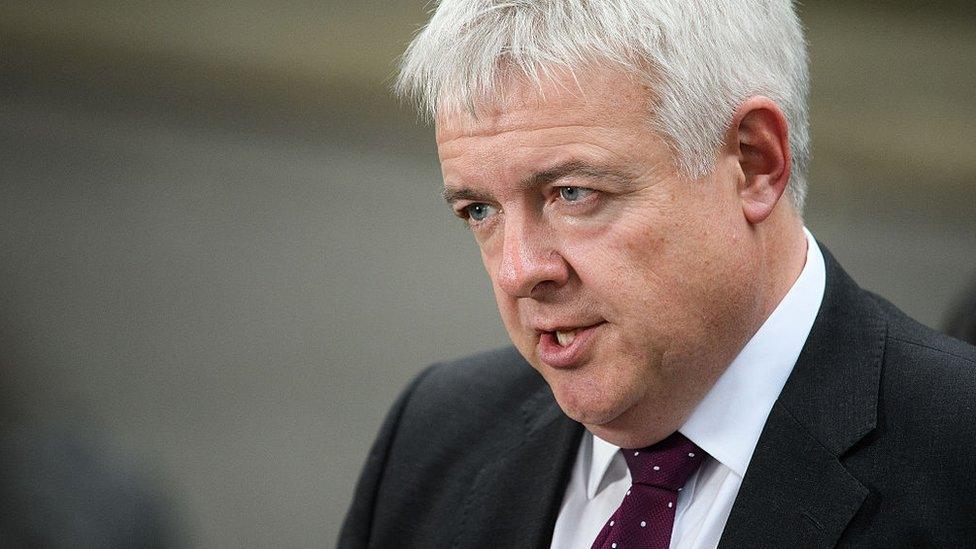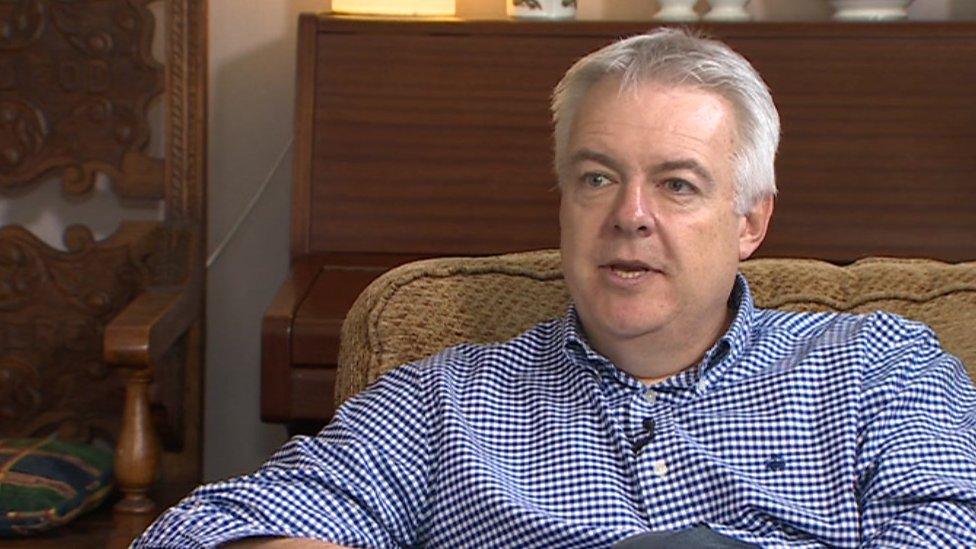Ministerial code regulator in Wales branded 'toothless'
- Published

Carwyn Jones was warned he should not have become an adviser to a steel and energy group.
A parliamentary body that accused Wales' former first minister of breaking rules regarding new jobs, has been described as "toothless".
Sir Alistair Graham, a former standards watchdog, said the Advisory Committee on Business Appointments (ACOBA) was powerless to discipline rule-breakers.
The body told Carwyn Jones that his GFG Alliance global advisory board member, external appointment was breaking their rules.
Mr Jones has denied any wrongdoing.
Sir Alistair, chairman of the Committee on Standards in Public Life between 2003 and 2007, told BBC Politics Wales ACOBA should be given "stronger powers" to discipline serving and former ministers.
ACOBA is responsible for vetting whether or not private sector jobs are appropriate for serving government ministers, as well as those who have been a minister within the past two years.
Ignoring the guidance of ACOBA is considered to be a breach of the ministerial code, but the body is only able to advise, and has no powers to enforce its judgements.
Sir Alistair said many people have commented that ACOBA was something of a toothless body.
"There are plenty of ways of getting around the advice that they give, and they don't monitor how their advice has been implemented, in the main... and the fact that it's advisory means it has limited powers."

Liberty Steel owns a steel plant in Newport
Mr Jones - who is still a serving Members of the Senedd for Bridgend - wrote to ACOBA to inform them he wanted to take up a position with GFG Alliance - the parent company of Liberty Steel.
In May, the committee told him the role would be inappropriate, because of the degree of insight Mr Jones had gained into the steel industry during his time as first minister.
He subsequently said he would instead take on a role with SIMEC, a subsidiary of GFG Alliance, which would remain in a non-steel related capacity for the time being.
ACOBA responded to tell Mr Jones the role with SIMEC would be appropriate and would be allowed to advise on steel issues from December.
This is because the ministerial code only applies for two years after ministers leave office.
In October, ACOBA again wrote to Mr Jones after he was publicly announced as a member of the GFG Alliance global advisory board.
Lord Eric Pickles, committee chairman, said in a letter: "The committee considers joining the GFG Alliance global advisory board whilst you are subject to the government's business appointment rules is contrary to its advice.
"As a consequence you are in breach of the government's business appointment rules."
In response, Mr Jones accused ACOBA of operating "without procedural rules, without a full right to a hearing, without any right of appeal (and) without any complaints process".
"That cannot be right with regard to law, fairness or transparency".
ACOBA has submitted its findings to the Welsh Government.

Lord Mike German said there was not a clear solution, despite arguments ACOBA should get more powers
Former deputy first minister, Lord Mike German, who was a member of ACOBA until last year, said it was a "very tricky issue" deciding how to strengthen powers.
The Liberal Democrat peer said: "There have been lots of occasions when people start thinking, 'is this something that ought to have a statutory basis?'
"But then, how do you stop people getting a job? And saying 'you have to go through the court if we don't agree with you about getting a job? It really isn't a satisfactory way of dealing with it.
"At the moment, it is very clear that the final arbiter in all this is the court of public opinion."
Any sanctions relating to a breach of the ministerial code by a serving or former Welsh Government minister fall under the discretion of the first minister.
The ministerial code in Wales was changed in 2017 to allow the first minister to request the advice of an independent advisor on breaches of the code, though the Welsh Government has confirmed it will not be doing so in this instance.
Sir Alistair argued that, while it is right that the first minister should have the final say, there were few powers available to sanction ex-ministers who break the code.
"I don't think there are any sanctions, except the sanction, which can be a powerful sanction, of publicity," he said.
The Welsh Government said it would respond to the ACOBA letter in due course.
ACOBA said it had increased its transparency and published details about its considerations and the information it has received online.
Politics Wales, BBC One Wales, 10:00 GMT on 22 November
- Published9 November 2020

- Published21 April 2018

- Published25 August 2019
